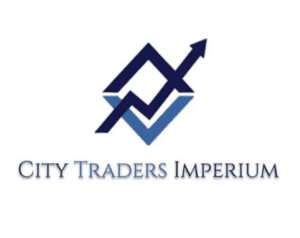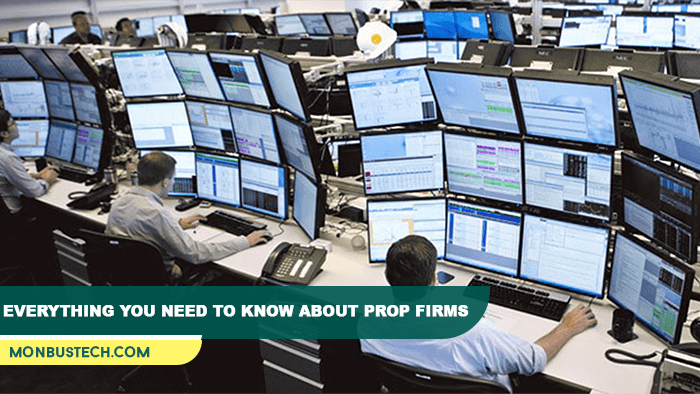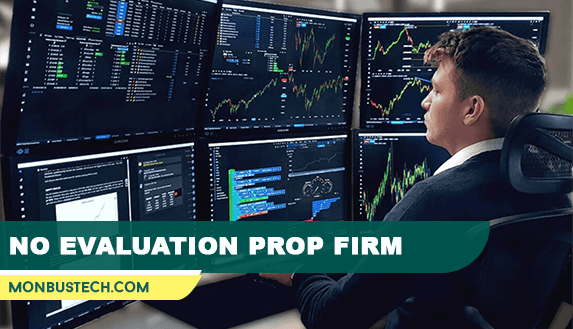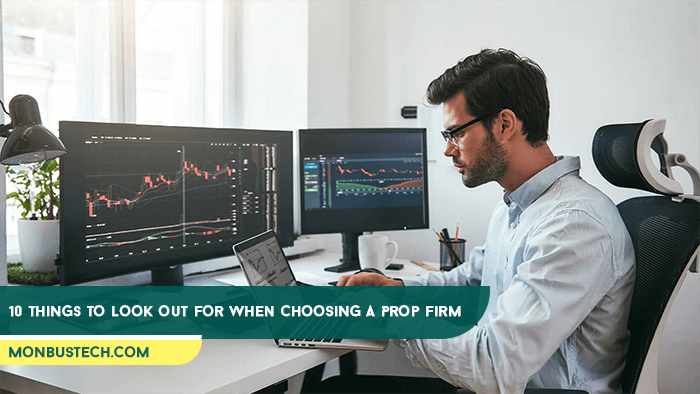Proprietary Trading Firm [ Forex Prop Firms ]
Prop firms are often talked about, but many people are unsure of their exact nature. If you are one of the people who care to know what the term “Prop Firm” is all about plus other nitty-gritty, then you have come to the right place.
This post is written to guide you on what a prop firm in forex is and all the important information you need to know about it as it covers the full meaning of a proprietary firm, how prop firms work, prop firm regulations, and how to get funded by a prop firm, risks attached to getting funded by prop firm, the top prop firm to consider, factors to look out for when searching for a prop firm to join
What Is a Prop Firm Trading?
A prop firm is a company that offers liquidity and remote capital access to individual retail traders around the world. The company provides traders capital that they can use to trade stocks, commodities, futures, derivatives, and currencies. This means that you have the freedom to choose what you want to trade as a trader.
Prop trading is something that has really taken off and that is generally because the average day individual doesn’t have enough capital on their own to make a living or trade full time. So when the trader makes profits, the company will deduct its amount depending on the agreement made. The terms of a company’s agreement with traders will vary from company to company. Some companies share a 50/50 or 25-30% depending on so many things
How Does Proprietary Trading Work?
Prop firms make capital available to traders so they can perform trading activities with a range of financial instruments. As a result, the trader is required to share any profits made with the firm, as per their profit-sharing agreement. So prop firms provide traders with the capital they need to trade, but to ensure their company is profitable, traders must put in the effort to make enough profit.
READ: 10 THINGS TO CONSIDER IN CHOOSING A PROP FIRM.
Thankfully, many prop trading firms provide traders with adequate support and enough resources to help them multiply their money. If a trader fails to make a profit for the company, there is nothing much that can happen because prop firms understand that losses are part of trading. However, the trader may fail to get their account doubled or hit the maximum drawdown stipulated by the firm and have their account reset or rescinded.
Are Proprietary Firms Regulated?
Yes, but not all prop firms are. In recent years, proprietary trading has faced increasing regulatory scrutiny and is now subject to a highly complex set of rules.
Please visit the following link for more information about prop regulations. As with any business, you should examine the honesty and integrity of principals and do your due diligence.
Is Prop Trading Legal?
Yes, prop trading is entirely legal. As a matter of fact, most prop trading firms are legally registered and officially recognized by the government of their countries. Therefore, there is nothing to be scared of as far as prop trading is legalized.
How Do Prop Firms Make Money?
There are two major ways through which prop firms make money:
The first is via the subscription fee that is imposed on their trading accounts. While some prop firms require a one-time subscription payment fee, others require that traders subscribe monthly.
The second way through which prop firms make money is the percent of the profit which they keep on every profitable trading. This profit-split percentage varies from one firm to the other. While prop firms like Audacity Capital share an equal 50-50 split with their traders, FTMO only takes a 10% share.
Regardless of the percent the prop firm takes, this is a sure way through which prop firms make money.
ALSO READ: PROP FIRMS WITH HIIGH PROFIT SPLITS FOR TRADERS
What Are the Risks attached to Prop Firm trading?
When you trade with a proprietary firm, they will provide you capital to trade, but it is up to you to ensure that profits are made.
No matter how small or large your trading portfolio is, there is only one rule: Always make money. Below are some of the risks attached to trading a prop firm account.
- There’s no wage structure: The term “hire” is used loosely within the context of a prop firm. New traders are rarely paid a base salary, although there are no rules against wage structures. Typically whatever you take home will rely entirely on how profitable you are in trading. The most important part of being a successful trader is generating consistent returns. if you do not make money, then you will not be employed for long
- Proprietary firms can steal your intellectual property: If you’re an exceptional trader, you can be sure someone at the back office is working hard to decode your strategy. The managers can simply steal your strategies and that may or may not matter to you but it’s something you should be aware of.
- Psychological stress: initially this will come from pressures you put o n yourself to pass the critical evaluation phase and even after then Trading someone else’s money can be a stressful endeavor. Accounting for losses and actually losing capital that is not yours can be emotionally tasking. So, you have to be ready for that
- Fees: Many prop shops require fees to be paid for platform, training, and account access. In addition, an initial deposit of capital may be required from the trader to act as a risk “buffer” for the firm “desk fee.” caters to utilities, terminals, trading software, and personnel wages. It is up to you to decide the prop trading firm to join and take these points into consideration when making your choice
- Market risks: If you are not keen on how the market moves, you might fail to catch up and lose all the money you have been funded. Other risks may include opportunity, concentration, inflation, and slippage risk.
- Possible Scam: Many prop firms have gone belly up or been fraudsters. make sure you do proper due diligence and know the risks involved. Check out our prop firm guide and reviews here
How to Get a Prop Trading Firm Account ( how to get a job at a prop trading firm )
Becoming a prop trader is one of the best decisions you can ever make, and the best part is that becoming a prop trader is not as hard as you think. First of all, you’ll need to learn how to trade and set up a reliable trading strategy. Then you’ll need to learn all you can about risk management, apply it to your strategy, practice then join a prop trading firm to get funded. Here are the basic requirements
1. Identify Your Kind of Prop Firm
The first step to getting a prop firm account is to search the list and types of prop firms you want. It is worthy of note that there are prop firms that require up to two stages of test or evaluation before you can get funded by them while there are other prop firms that offer instant funding, they are commonly referred to as no challenge prop firms or instant funding prop firm.
Check this quick guide: 10 Things to Look out For When Choosing a Prop Firm
You should decide on which of these prop firms you are going with. To make things easier, check our list of top 5 Instant funding prop firms here.
2. Pass Verification or Purchase Instant Account
After identifying the kind of prop firm you want and the one that suits your style, sign up with a prop firm and pass their verification (if required) typically takes 30 days.
3. Meet a Prop Firm Criteria
You sit the challenges. Most, but not all, have challenges that you need to pass before you will get the funds. Typically 30-90 days.
4. Access to The Funds
Upon passing the prop firm challenge, you will get access to the funds and profits
Pillars of Sustainable Prop Firm Trading:
How you can be successful at proprietary trading.
Mindset/Psychology – You will go through a lot of emotions while trading thus you need a very healthy and positive mindset. You must be able to control your mind at all times. Do some sports, practice yoga, listen to some motivational videos, learn a new skill, read biographies of successful people, and most important be positive and enjoy trading
High levels of discipline – You have to build for yourself a trading system/methodology with an edge to follow. Stick to the process no matter what. Even a slight deviation from the process can lead to failure and the market will punish you very hard
Risk/Money Management –You must know the risk involved in your trade, as well as your own personal risk tolerance, before entering a trade. Losing is part of the game so you need to become comfortable with it. Position sizing is another key aspect of trading that you should understand beforehand.
Benefits of Proprietary Trading
Trading platforms and prop firms are often confused for one another, but proprietary trading companies offer many benefits that make them distinct from trading sites.
- It provides you with the necessary funding for your trading account, offers huge returns, and allows you to grow financially. Prop firm and funding companies are attractive options for experienced but ‘undercapitalized’ traders who want to leverage their skillset.
- There’s zero risk of losing your own capital because prop firms use their own funds.
- Protection against huge losses – Most prop firms limit the capital drawdown of their traders to a level that is in line with the firm’s risk tolerance.
Top Prop Firms to Consider
These are proprietary trading firms that are well known and established. However, please ensure that you do your own due diligence on your chosen proprietary firm. We do have more post related to this topic. See: What to Look out For when Choosing a Prop Firm
- CITY TRADERS IMPERIUM

Sign up fee: $109 – $649
Account size: $10,000 – $70,000
Drawdown: 5%
Profit Share: 50-70%
Sign up fee: $125 – $275
Account size: $200,000 – $500,000
Drawdown: if the balance falls below the minimum account balance you will be pulled from your trades right away
Profit Share: 80%

Sign up fee: $410 – $684
Account size: $5,000 – $10,000.000
Drawdown: 4%
Profit Share: 65%
Sign up fee: $182 – $1,268
Account size: $10,000 – $200,000
Drawdown: 5%
Profit Share: 70%
Sign up fee: $275 – $875
Account size: $24,000 -$80,000
Drawdown: N/A
Profit Share: 50%
In conclusion, trading rewards you like no other profession in the world. It teaches you a lot about life. You will become humble, you will have more knowledge, you will have more money, more social life, good relationship, more time, and last but not least strong mental health to survive any downs in life.



















